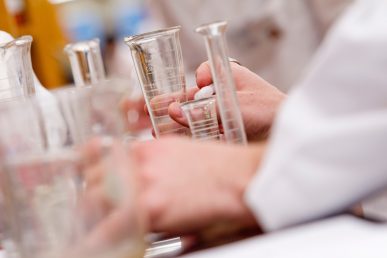$1.9M NSF-funded initiative to transform UIC undergraduate chemistry offerings
Supported by a five-year, $1.9 million grant from the National Science Foundation, the University of Illinois Chicago department of chemistry will launch a project consisting of evidence-based research of teaching and learning practices, course and curriculum revisions and faculty development, all with the intention of enhancing STEM education for undergraduate students.
The work will be supported by professional development offered jointly by UIC’s Center for the Advancement of Teaching Excellence and the Office of the Vice Provost for Diversity.
The initiative, which aims to serve the “modern chemistry student,” will incorporate current research and societal problems to improve how courses prepare students to apply their knowledge to contemporary issues.
Donald Wink, UIC professor of chemistry and the grant’s principal investigator, says the program, which will begin this fall, has several unique aspects.
“The first is that it will involve all of our undergraduate offerings, from general chemistry through the most advanced undergraduate courses,” he said. “Second, all courses will be transformed using a coherent set of evidence-based and inclusive instructional practices, close linkages between instruction and research, and new forms of assessment that align with curricular transformation efforts.”
Over the course of the five-year project, more than one dozen UIC chemistry faculty, both tenure track and non-tenure track, will work in collaborative course teams.
“In this way, the program draws on UIC’s existing strengths in undergraduate teaching and chemistry research,” said George Papadantonakis, a co-principal investigator on the project, and clinical associate professor and associate head of chemistry.
The goals of the curricular reform effort include aligning courses using a consistent set of overarching concepts in chemistry. Courses also will link chemistry content to applications in society and current research and science practices to support student knowledge and skill growth over time.
Mike Stieff, another co-principal investigator, professor of chemistry and learning sciences and co-director of the Learning Sciences Research Institute, explained the important research goals of the project, including “a deeper understanding of how individual and collaborative faculty work can change courses over time and lead to institutional transformation.”
In addition, the program will include a deep examination of the teaching and learning in each of the affected courses, including through the use of action research methods.
Minjung Ryu, another co-principal investigator and assistant professor of chemistry and learning sciences, will support this process, which she explains as a process where “teachers formulate specific questions to investigate in their courses, allowing them to contribute critical evidence-based research on change in higher education.”
Other key personnel involved with the project are Erin O’Leary, executive director of the Center for the Advancement of Teaching Excellence at UIC, and Charu Thakral, associate vice provost for diversity at UIC.

